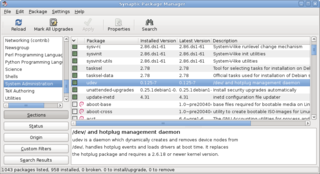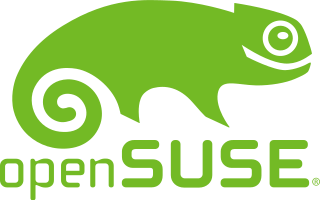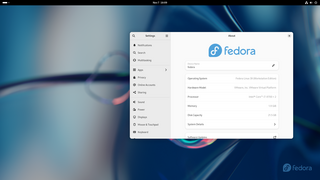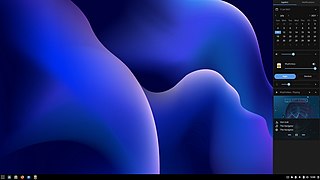
Debian, also known as Debian GNU/Linux, is a Linux distribution composed of free and open-source software and optionally non-free firmware or software developed by the community-supported Debian Project, which was established by Ian Murdock on August 16, 1993. The first version of Debian (0.01) was released on September 15, 1993, and its first stable version (1.1) was released on June 17, 1996. The Debian Stable branch is the most popular edition for personal computers and servers. Debian is also the basis for many other distributions that have different purposes, like Proxmox for servers, Ubuntu or Linux Mint for desktops, Kali for penetration testing or Pardus and Astra for government use.

Slackware is a Linux distribution created by Patrick Volkerding in 1993. Originally based on Softlanding Linux System (SLS), Slackware has been the basis for many other Linux distributions, most notably the first versions of SUSE Linux distributions, and is the oldest distribution that is still maintained.

A package manager or package-management system is a collection of software tools that automates the process of installing, upgrading, configuring, and removing computer programs for a computer in a consistent manner.
Stack is a tool to build Haskell projects and manage their dependencies. It uses the Cabal library but with a curated version of the Hackage repository called Stackage.

Arch Linux is an independently developed, x86-64 general-purpose Linux distribution that strives to provide the latest stable versions of most software by following a rolling-release model. The default installation is a minimal base system, configured by the user to only add what is purposely required.
Technical variations of Linux distributions include support for different hardware devices and systems or software package configurations. Organizational differences may be motivated by historical reasons. Other criteria include security, including how quickly security upgrades are available; ease of package management; and number of packages available.

MacPorts, formerly DarwinPorts, is a package manager for macOS and Darwin. It is an open-source software project that aims to simplify the installation of other open source software. It is similar in function to Fink and the BSD ports collections.

openSUSE is a free and open source Linux distribution developed by the openSUSE project. It is offered in two main variations: Tumbleweed, an upstream rolling release distribution, and Leap, a stable release distribution which is sourced from SUSE Linux Enterprise.
A software repository, or repo for short, is a storage location for software packages. Often a table of contents is also stored, along with metadata. A software repository is typically managed by source or version control, or repository managers. Package managers allow automatically installing and updating repositories, sometimes called "packages".

Fedora Linux is a Linux distribution developed by the Fedora Project. It was originally developed in 2003 as a continuation of the Red Hat Linux project. It contains software distributed under various free and open-source licenses and aims to be on the leading edge of open-source technologies. It is now the upstream source for CentOS Stream and Red Hat Enterprise Linux.

According to the Free Software Foundation Latin America, Linux-libre is a modified version of the Linux kernel that contains no binary blobs, obfuscated code, or code released under proprietary licenses. In the Linux kernel, they are mostly used for proprietary firmware images. While generally redistributable, binary blobs do not give the user the freedom to audit, modify, or, consequently, redistribute their modified versions. The GNU Project keeps Linux-libre in synchronization with the mainline Linux kernel.

The Haskell Platform is a collection of software packages, tools and libraries that create a common platform for using and developing applications in Haskell. With the Haskell Platform, Haskell follows the same principle as Python: "Batteries included". Since 2022, the Haskell Platform has been deprecated.
NixOS is a free and open-source Linux distribution based on the purely functional Nix package manager. NixOS is composed using modules and packages defined in the nixpkgs project.
Haskell is a general-purpose, statically-typed, purely functional programming language with type inference and lazy evaluation. Designed for teaching, research, and industrial applications, Haskell has pioneered a number of programming language features such as type classes, which enable type-safe operator overloading, and monadic input/output (IO). It is named after logician Haskell Curry. Haskell's main implementation is the Glasgow Haskell Compiler (GHC).

Homebrew is a free and open-source software package management system that simplifies the installation of software on Apple's operating system, macOS, as well as Linux. The name is intended to suggest the idea of building software on the Mac depending on the user's taste. Originally written by Max Howell, the package manager has gained popularity in the Ruby on Rails community and earned praise for its extensibility. Homebrew has been recommended for its ease of use as well as its integration into the command-line interface. Homebrew is a member of the Open Source Collective, and is run entirely by unpaid volunteers.

Solus is an independently developed operating system for the x86-64 architecture based on the Linux kernel and a choice of Budgie, GNOME, MATE or KDE Plasma as the desktop environment. Its package manager, eopkg, is based on the PiSi package management system from Pardus Linux, and it has a semi-rolling release model, with new package updates landing in the stable repository every Friday. The developers of Solus have stated that Solus was intended exclusively for use on personal computers and will not include software that is only useful in enterprise or server environments.

Yesod is a web framework based on the programming language Haskell for productive development of type-safe, representational state transfer (REST) model based, high performance web applications, developed by Michael Snoyman, et al. It is free and open-source software released under an MIT License.

GNU Guix is a functional cross-platform package manager and a tool to instantiate and manage Unix-like operating systems, based on the Nix package manager. Configuration and package recipes are written in Guile Scheme. GNU Guix is the default package manager of the GNU Guix System distribution.












